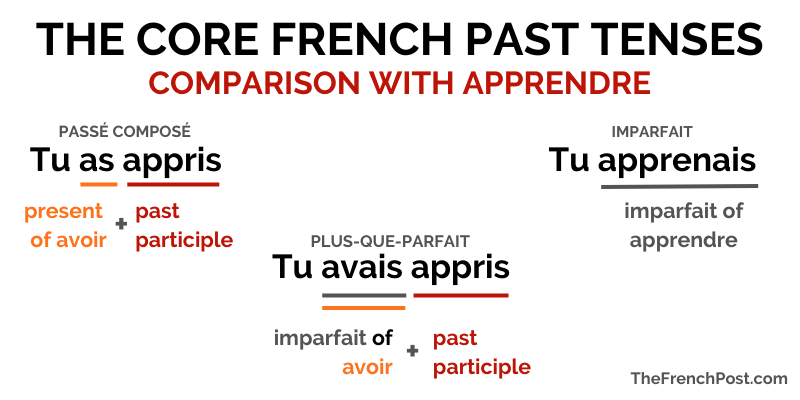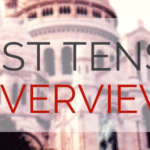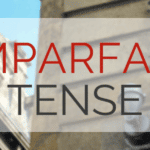
The French plus-que-parfait past tense is how you talk about one past event occurring before another past event.
The exact same concept and tense also exists in English, though as a native speaker you may have never consciously paid attention to it. A couple of English examples:
“Before I found out that the woman was a celebrity, I had guessed that she was very wealthy.”
“George had asked about me before I arrived at the party.”
Understanding how the Plus-Que-Parfait fits into the past tenses
The plus-que-parfait tense is the final piece of the three most important French past tense forms to learn, along with the passé composé and imparfait.
Let’s use an example with tu (“you”) and apprendre (“to learn”), which would be translated into English from the respective French past tenses in the following ways:
Passé composé
“You learned” or “You have learned”
Imparfait
“You learned” or “You were learning”
Plus-que-parfait
“You had learned”
You can see that passé composé and imparfait conjugations don’t translate perfectly into English, but the plus-que-parfait generally translates seamlessly from French into English (and vice-versa).
How to form the plus-que-parfait tense
The conjugation of the plus-que-parfait is almost a mash-up of the imparfait and the passé composé past tenses.
- Like with passé composé, you use a auxiliary verb that’s usually the conjugated form of avoir (but is sometimes être). You also use the past participle version of the main verb.
- The auxiliary verb conjugation you use with plus-que-parfait; however, is not the present tense form of avoir (otherwise you would just be recreating the passé composé). Instead, you use the imparfait conjugation of either avoir or être.
See the chart below for how apprendre would be conjugated into each of the three tenses, and the connections between these three tenses.

More examples of the plus-que-parfait
The plus-que-parfait construction is often used along with passé composé (and less often the imparfait) to imply a sense of order to two past events. For example, with passé composé:
Elle a découvert qu’ils avaient oublié leur promesse. (“She discovered that they had forgotten their promise.”)
J’ai dit à mes amis que j’avais décidé de rester à la maison. (“I told my friends that I had decided to stay home.”)
With the imparfait:
Nous avions rangé tous les meubles avant d’apprendre que nos parents vendaient la maison. (“We had put away all the furniture before we learned that our parents were selling the house.”)
Plus-que-parfait with être verbs
Just as with passé composé, there is a list of verbs (often called the “Dr Mrs Vandertramp” verbs as a mnemonic for the first letters of each verb in this category) in the plus-que-parfait that are special because:
- They get conjugated with être instead of avoir, and
- The past participle agrees in gender and number with the subject of the sentence.
So the plus-que-parfait conjugation rules we’ve already discussed in this lesson remain true, except you’ll switch out the appropriate imparfait form of avoir with être, and you’ll add an e and/or an s to the past participle if necessary to make it agree with the subject of the sentence.
For example:
Après les parents de Paul étaient sortis au ciné, sa petite amie est venue chez eux. (“After Paul’s parents had gone out to the movies, his girlfriend came to their house.”)
Nous étions déjà partis au moment où notre commande est arrivée. (“We had already left by the time our order arrived.”)
Summary
In conclusion, these are the steps to form the plus-que-parfait:
- Start with the imperfect tense of either avoir or être
- Add on the past participle form of the main verb (which are the same past participles you’ve learned for passé composé).
- If the verb is an “être verb”, check the subject of the sentence and add an e, s, or es if necessary to the end of the past participle.
Next Steps
You should now have a solid understanding of how and when to use the plus-que-parfait! You might want to review our passé composé or imparfait lessons, or move on to the present or past subjunctive.




i learned a lot!!!!!!!!!!!!
Thank you! This is very helpful
It’s GREAT WAY TO simplify COMPLEX THING. I LEARNT IN ITS simple style
c’est bien MERCI
J’apprecie votre aide. Merci mille fois.
merci BEAUCOUP. ça m’a bien aidé à bosser pour mon contrôle demain
Bien sûr! Merci pour votre gentillesse!
[Reference to typo]
Thank you so much for your helpful comment!
No problem, good post by the way, very helpful. I like the three step conclusion.